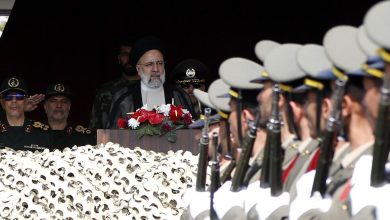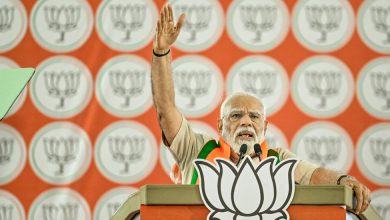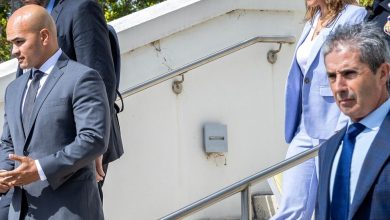As Protest Paralyzes Canada’s Capital, Far-Right Activists Abroad Embrace It

OTTAWA — Eleven days into an unruly occupation against coronavirus restrictions that has paralyzed Canada’s capital, the protests have become a rallying cry for powerful far-right and anti-vaccine groups around the world that have made the cause their own.
The demonstration in Ottawa started in January as a loosely organized convoy of truck drivers and protesters rumbling across the country to oppose the mandatory vaccination of truckers crossing the U.S.-Canada border. It soon attracted the support of other Canadians exhausted by nearly two years of pandemic restrictions.
Some were clearly on the fringe, wearing Nazi symbols and desecrating public monuments. But many described themselves as ordinary Canadians driven to take to the streets by desperation.
“They keep doing the same thing, and it’s not working,” said Nicole Vandelaar, a 31-year-old hairdresser protesting in the capital. “They have to do something else. No more lockdowns. Let us live our lives.”
On Sunday, after a weekend of boisterous demonstrations, the authorities in Ottawa declared a state of emergency and said the police were overwhelmed. “We continue to employ all available officers, there are no days off,” the Ottawa police chief, Peter Sloly, said Monday. “This is not sustainable.”
The message at the heart of the protests — that government has been overreaching for too long — has resonated far away across Canada’s borders.
Donors have contributed millions of dollars in online campaigns with hashtags, images and messages of support spreading widely across social media platforms.
The protest has also sparked discussion of similar demonstrations in the United States. American truckers are in the planning stages of launching their own convoy, from California to Washington, said Brian Brase, a trucker involved in organizing the effort.
Photos of the Canadian truckers appeared on anti-vaccine groups on Facebook and other social networks about two weeks ago. Since then, prominent far-right figures in numerous countries, including the United States, Australia and Germany, have praised the protests, spreading the images and arguments even more widely.
The hashtag used by the truckers, #FreedomConvoy, has spread quickly across social media. On Facebook, the hashtag has been shared over 1.2 million times since Jan. 24, according to CrowdTangle, a Facebook-owned analytics tool.
Another Facebook group dedicated to following and supporting the truckers has attracted nearly 700,000 followers.
Meta, the parent company of Facebook, said it removed several groups associated with the convoy for violating their rules around inauthentic behavior. One group had sent people to external sites to buy merchandise. Another group had violated Facebook’s rules by sharing content tied to the banned QAnon conspiracy movement. The company said it was still reviewing other groups formed in connection to the truckers’ protest.
On the messaging app Telegram, several far-right figures, including Dan Bongino, Michael Flynn and Ben Shapiro, have promoted the protest and shared links to fund-raising sites that have collected millions of dollars.
American anti-vaccine groups have also begun forming local wings of the movement and have urged truckers in the United States to adopt the tactics in Canada.
A GoFundMe page created on Jan. 14 accumulated more than $7.8 million before it was frozen by the crowdfunding platform and then halted on Friday. In a statement, the company said donors could submit requests for a refund.
GoFundMe had released only about $789,000 of those donations before the fund-raiser was shut down, after the company consulted with the police.
In the United States, Senator Ted Cruz, the Texas Republican, called for the Federal Trade Commission to investigate GoFundMe over the halted campaign, joining a chorus of other U.S. politicians and legal figures accusing the crowdfunding site of deceiving donors. Supporters have since been channeling their funds to other platforms, including GiveSendGo, a Christian crowdfunding site that had raised more than $5 million as of Monday evening.
The funds will be used to “provide humanitarian aid and legal support for the peaceful truckers and their families,” Alex Shipley, a spokeswoman for GiveSendGo, said in an email.
In Ottawa, the occupation has paralyzed the core and political center of Canada’s capital, pushing residents to sleepless fury and anxiety, and causing many businesses to shutter, losing tens of millions of dollars.
But even as a growing number of politicians denounced them, the protesters across from the country’s graceful Parliament buildings made on thing clear: They were not leaving.
Mr. Sloly, the police chief, said at a news conference on Monday that his force would need an additional 1,800 officers — the force now has 1,200 officers — to bring the occupation to an end. It was unclear where those additional officers would come from.
Mr. Sloly has come under criticism for allowing the protesters to block off whole sections of the city with their heaving trucks and sound their bellowing horns late into the night. His force, already boosted by several hundred officers from other forces, began to crack down. On Sunday, officers shut down a staging area for protesters well outside of downtown and confiscated more than 3,000 liters of diesel fuel.
Almost two years after the pandemic hit Canada, the country remains in various stages of lockdown, with restaurants closed in the country’s two largest provinces, Ontario and Quebec, until only recently. Stores, cinemas, and galleries have been shut or faced customer limits in much of the country, where rules vary province by province.
Some of the protest leaders have called on Mr. Trudeau to overturn both national pandemic measures and more local ones — a constitutional impossibility.
On Monday, several government cabinet ministers held a news conference on Monday, denouncing the protesters as lawbreaking extremists who had antagonized many of the city’s residents.
Marco Mendicino, the federal public safety minister, said that there should not be negotiations with protesters.
“It would be a terrible precedent to say that if you show up to the nation’s capital with heavy equipment and blockade the capital city, that you can force reckless change in our public policy,” Mr. Mendicino said, adding, “Canadians deserve to feel safe in their communities and no one is above the law.”
In the protest’s epicenter on Monday, the atmosphere was festive as the sun shone down, warming the temperature to just below freezing. Homemade signs decorated the iron fences that encircle the Parliament grounds. “For cowards, freedom is always extremist,” read one.
A group of people danced to music blaring from speakers on the back of a huge truck. The Canadian flag fluttered from a giant crane.
“I want freedom,” said Rodica Stricescu, 64, a Romanian-born caregiver who came to Canada a few years after the fall of the Soviet Union. “I ran from communism to be here. I don’t want the same situation to happen here.”
Ms. Stricescu had driven eight hours from Windsor, Ontario, for the second weekend in a row to participate in the protests with her daughter.
“I will keep coming back until they say yes,” she said.
Some of the protesters, like Ms. Stricescu, said they had been vaccinated — if reluctantly. Others, like Ms. Vandelaar, were among the 16 percent of Canadians who have not received a single shot.
“The prime minister is triple-vaxxed,” she said. “He socially distances. And he still got it.”
Ms. Vandelaar, a hair stylist from Wainfleet, a rural township about seven hours away, wore clothing made for the protest: a black hat with “fringe minority” written across the brim, and a sweatshirt that read, “Proud member of a small fringe minority with unacceptable views.”
Both were references to Mr. Trudeau’s dismissal of the protesters last week as a “small fringe minority.”
On Monday, Justice Hugh McLean of the Ontario Superior Court offered Ottawa residents a hint of relief, granting a temporary injunction barring the horn honking and authorizing the police to arrest or remove those knowingly violating the order.
Many Ottawa residents are besides themselves.
“This is unbelievably selfish,” said Zully Alvarado, walking through protest grounds displaying a mask — a symbol, she said, of her allegiance to the vaccinated majority. An Ottawa hair stylist, she said the noise, and closures resulting from the occupation, have had a big effect on people already suffering from mental health issues, as well as people who are homeless.
“This is not the Canadian spirit,” she said.
Fed up with what they call a “timid” police response to the protest, some residents of the neighborhoods overrun by trucks are challenging the protesters.
On Kent Street in Ottawa, Christopher Renaud, frustrated after many sleepless nights, kicked an empty fuel can sitting in the road. A heated argument with several protesters followed.
“I’m at the point where a regular car horn is setting me off,” Mr. Renaud, a government employee said after walking away. “I’ve never felt so abandoned by government.”
A protester stepped up and apologized to Mr. Renaud for the disruption.
“The reason we’re invading your city is to uphold our civic rights,” he told Mr. Renaud. “It’s because we feel our body is being invaded.”
Catherine Porter and Ian Austen reported from Ottawa. Sheera Frenkel reported from Oakland, Calif. Vjosa Isai contributed reporting from Toronto and Alan Feuer from Albany.



